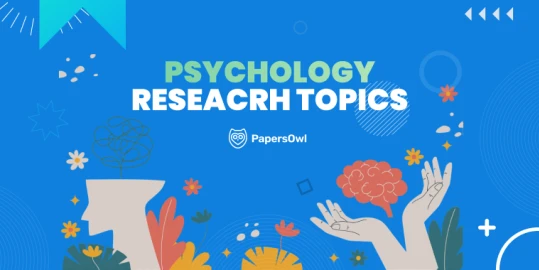A clear, focused topic helps you stay on track and connect with readers. It also lets you explore ideas backed by the APA guide, DSM-5, and peer-reviewed academic journals. This article offers fresh, relevant research topics for college students. They cover clinical psychology research topics, including the psychological effects of social media.
We’ll guide you through choosing a topic and understanding ethical considerations. Expect expert tips, use cases, and links to trusted mental health resources. If you’re short on time, you can also buy psychology paper and focus on what matters most.
Let’s find a topic that goes beyond the page — and into the real world!
Psychology Research Paper Definition and Purpose
A psychology research paper explores how people think, feel, and behave. Drawing from real data and trusted theory, it dives into brain function, neuropsychology, and mental health issues. The APA outlines clear rules for structure, tone, and citation. Following them adds clarity and keeps the work professional.
The main goal is to examine a question through careful study. You might focus on clinical psychology, psychological effects of trauma, or the role of mental health resources in recovery.
According to the American Psychological Association, research papers must use evidence, not opinions. This builds trust and adds weight to your research findings.
Such work helps expand our understanding of human behavior and improves practice. You may cover clinical psychology research topics or write about well-being. In any case, your effort will support mental health work in schools, clinics, and public programs.
How to Choose a Psychology Research Topic?
Finding the right idea takes more than just picking what sounds smart. Your topic should fit your interests, meet your course goals, and stay grounded in existing research. First and foremost, a good paper begins with a strong question.
- Step 1: Start with curiosity. What part of psychology grabs your attention — clinical psychology, neuropsychology, or mental health? Think about your own experiences or stories you’ve heard. Professor emerita at UMass Amherst, Dr. Susan Krauss Whitbourne, says, “Research driven by personal passion tends to go deeper.”
- Step 2: Check academic trends. Look into academic journals, APA guides, and databases like PsycINFO. Recent studies often examine topics like adolescent mental health, social isolation, or the impact of social media on mental well-being.
- Step 3: Narrow it down. Broad ideas like “stress” are too broad. Refine them. For example, you can explore coping strategies for post-traumatic stress disorder or compare clinical psychology research topics across diverse populations.
- Step 4: Match the scope with the time. Can you finish this study in a few weeks? Or does it require further research and long-term data? Choose wisely to avoid burnout.
- Step 5: Ask your instructor for a second opinion. Although you might think your topic on cognitive behavioral therapy is fresh, it may lack enough sources or depth.
Use tools like APA’s Thesaurus of Psychological Index Terms to refine keywords. Choose something meaningful that adds to the field and helps to enhance mental health understanding.
Need ideas to begin? Choose the topic you will love and take the first step toward writing a focused, relevant paper.
Writing Tips for Psychology Research Topics
Writing a strong paper in psychology requires structure, accuracy, and critical thinking. Every step — from outlining to citing — should follow the standards set by the APA Publication Manual (7th ed.).
- Clarify your thesis. Your paper needs a clear focus. The main argument should stand out from the start. Dr. Robert Sternberg, former APA president, notes, “Good psychology writing comes from good psychology thinking.”
- Stick to evidence. Use peer-reviewed journals, DSM-5 categories, and APA databases. Avoid vague terms. When analyzing mental health interventions, refer to studies that show measurable outcomes.
- Break it down. Organize your content into digestible parts — introduction, methods, results, and discussion. Keep sentences short. This supports both cognitive processes and the reader’s well-being.
- Use APA formatting. Formatting must be correct for in-text citations and your references page. Misusing APA style can lower your grade, even if your ideas are strong.
- Stay objective. Avoid overgeneralizations. Let the research findings speak for themselves. Be mindful of the ethical implications. Especially when writing about mental health disorders or psychological aspects of personality traits.
- Revise with intention. Proofread several times. Use tools like the APA’s Academic Writer or the Hemingway App to check clarity and tone. If needed, consult a online research paper service for editing support.
- Keep it relevant. Your conclusion should connect the paper to broader mental health concerns and show how the topic relates to real-life challenges, such as academic performance, pain management, or the impact of social media on mental well-being.
Mastering these skills not only helps with grades, but it also prepares you for future psychology research projects and deeper exploration of interesting psychology research topics.
Examples of Psychology Research Questions
Developing strong research questions for psychology is a key part of the research process. Consider these questions:
- How does chronic stress affect working memory and other aspects of cognitive function in college students? This question links to cognitive processes and short-term memory. It can be explored with help from studies in cognitive neuroscience.
- What role do social media platforms play in shaping teenagers’ perceptions of body image and mental health? Research shows a rise in mental illness symptoms among teens connected to online comparisons. The DSM-5 also notes that body image concerns often co-occur with anxiety disorders.
- Do early school-based interventions reduce future risks of anxiety in children showing early signs of emotional distress? This looks at children’s mental health and the impact of early mental health services. Programs like SEL (Social Emotional Learning) often target these issues.
- How does Acceptance and Commitment Therapy (ACT) compare to cognitive behavioral therapy (CBT) in treating trauma? Studies in the APA Handbook of Psychotherapy suggest both are effective, but ACT may better support clients with complex trauma histories. This is a rich area for exploring different mental health care models.
- What cultural differences influence the expression of depressive symptoms across Western and non-Western populations? Here, you’re dealing with cultural psychology, cultural identity, and gender differences. Language, beliefs, and stigma all affect how mental health disorders are shown or hidden.
- How do bipolar disorder symptoms impact interpersonal relationships in long-term partnerships? Bipolar disorder is a serious mood disorder. The National Institute of Mental Health (NIMH) emphasizes how emotional shifts influence closeness, communication, and conflict.
- What are college students’ attitudes toward using campus mental health services during exam periods? This topic dives into mental health perceptions and barriers to care. Surveys and interviews can help reveal why some students seek help while others avoid it.
Each of these questions can lead to full psychology research projects. They encourage deep analysis, give students valuable insights, apply psychological theories, and address real-world problems. If you’re unsure where to begin your next research, or need the full paper written, consider using platforms like PapersOwl to do my essay and get guidance or help structuring your ideas.
Psychology Research Paper Topics for College Students
Social Psychology Research Topics
According to the APA Dictionary of Psychology, social behavior often hinges on perceived norms and identity-based motivations. Therefore, it is crucial to explore psychology research topics that reflect today’s digital and social landscapes.
- How peer pressure influences moral decision-making in adolescence
- The role of social identity in online group behavior
- Exploring conformity and nonconformity in digital protest movements
- How rumors spread in times of crisis: A behavioral study
- Perception of authority and obedience in work-from-home environments
- The psychology behind cancel culture and groupthink
- Emotional contagion in social networks
- Reactions to public shaming on social media
- The impact of social exclusion on stress levels
- How social roles shift in virtual communities
Clinical Psychology
The DSM-5 recognizes that mental disorders often overlap, making integrative diagnosis essential. For instance, PTSD and depression frequently co-occur, requiring customized treatment plans. Find real-world examples in these psychology case study topics.
- Early diagnosis of PTSD symptoms in first responders
- Treating anxiety without medication: A CBT-based approach
- The impact of economic stress on mental health and therapy outcomes
- Ethical limits in clinical hypnosis treatment
- Dual diagnosis: Challenges in treating co-occurring substance use disorders
- The use of art therapy in adult trauma survivors
- Measuring therapy resistance in clients with bipolar disorder
- How chronic pain overlaps with mental health disorders
- Telepsychology and its limitations in rural populations
- Role of gender in treatment plans for mood disorders
Experimental Psychology
Experimental psychology provides a window into cognitive function under controlled conditions. The APA guidelines emphasize replicability and transparency in psychology research projects, which shape interventions and treatments.
- How framing affects consumer choices: A behavioral test
- Reaction time variance under stress conditions
- Neural response to familiar versus unfamiliar voices
- Exploring the placebo effect in stress management
- Auditory illusions and their influence on short-term memory
- Simulating sensory deprivation to test resilience
- Influence of scents on reaction time and mood
- Experimental study on mirror neuron activation in empathy
- Language framing and moral judgment tasks
- Testing false memory implantation through suggestion
Developmental Psychology
Research from the Society for Research in Child Development shows that parenting style can directly impact emotional growth and resilience. These are crucial research topics for shaping inclusive educational and parental strategies.
- Delayed gratification and academic performance in teens
- How parenting style influences emotional resilience
- The rise of “gentle parenting” and its psychological outcomes
- Screen time and its effect on cognitive function
- Developmental milestones in children raised in multilingual homes
- Effects of parental separation on social development
- Birth order and academic ambition
- How adolescents process trauma differently from adults
- Social comparison in early adolescence
- Generational attitudes toward mental health
Child Psychology
According to the DSM-5, early-onset mental health conditions often manifest as behavioral issues. Early diagnosis is key to long-term outcomes, making these psychology research topics both timely and essential.
- Emotional literacy in preschool education
- Cognitive development in homes with digital assistants
- How early exposure to music shapes learning styles
- Identifying signs of mental illness in early school years
- The role of pretend play in problem-solving skills
- Nutrition and behavior in early childhood
- Impact of caregiver attachment on self-regulation
- Diagnosing ADHD: A critical look at DSM-5 criteria
- How children understand fairness across cultures
- Influence of parental anxiety on children’s mental health

Criminal Psychology
As outlined in APA’s forensic psychology guidelines, understanding criminal behavior requires a blend of neurobiological insight and social context, particularly in youth offenders with histories of trauma.
- The role of early trauma in developing antisocial behavior
- How guilt and remorse manifest differently in offenders
- The psychology behind false confessions
- Moral disengagement in white-collar crime
- Behavioral patterns in cybercriminals
- Studying impulse control in repeat offenders
- Effectiveness of exposure therapy in treating violent offenders
- Victim-blaming: A psychological defense mechanism?
- The mental profile of arsonists
- How media portrayals influence public perceptions of criminal minds
Cultural Psychology
A study published in the Journal of Cross-Cultural Psychology highlights how cultural context changes how we perceive mental illness. These psychology topics are vital in creating inclusive mental health systems.
- Acculturation stress and its impact on immigrant adolescents’ sense of belonging
- Expression of grief across cultural traditions
- Cross-generational conflict in bicultural families
- How collectivist values influence mental health perceptions
- Cultural taboos and emotional suppression
- Spiritual beliefs and their role in trauma recovery
- Parenting beliefs among diaspora communities
- The psychology of bilingualism and identity
- How cultural differences affect decision-making styles
- Understanding the Role of Cultural Identity in Mental Health Treatment Outcomes
Health Psychology
The APA Division 38 emphasizes that behavior is deeply tied to health outcomes. These research topics show how stress and coping impact long-term physical and mental wellness.
- Chronic illness and its psychological toll on young adults
- Behavioral strategies in weight management programs
- The link between sleep habits and psychological well being
- Smoking cessation through commitment therapy techniques
- Role of resilience in cancer treatment recovery
- Social support networks and mental health care outcomes
- Effects of health misinformation on behavior
- Personality traits and chronic disease management
- Coping styles in patients with autoimmune diseases
- Mental health interventions in pain management clinics
Sports Psychology
Research in The Sport Psychologist journal shows that stress management strategies and performance rituals can improve both well-being and athletic output.
- Visualization and mental imagery in performance improvement
- Coping with career-ending injuries
- How pressure affects young athletes’ mental health
- The role of motivation in comeback stories
- Group cohesion and team performance
- Managing anxiety before high-stakes games
- How fan behavior influences athlete morale
- Risk of substance use disorders in competitive sports
- Gender dynamics in coaching relationships
- The psychological cost of constant travel
Educational Psychology
As noted in the APA Handbook of Educational Psychology, understanding learning behavior requires both emotional and cognitive analysis. These research topics bridge both.
- The impact of academic stress on teenage mental health
- Attention span and fidget devices in learning environments
- Mindset theory in low-income classrooms
- Role of teacher empathy in student outcomes
- How expectations shape learning behavior
- Inclusive education and psychological well-being
- Evaluating the use of cognitive behavioral therapy CBT in school settings
- The link between perfectionism and school burnout
- How praise influences motivation
- Technology’s impact on cognitive processes in learning
Social Media Psychology
The Journal of Cyberpsychology reports that social platforms shape behavior and mood regulation. These psychology research topics help decode emerging challenges in digital life.
- Social comparison and self-esteem in Instagram users
- The rise of parasocial relationships with influencers
- How digital detox impacts emotional regulation
- Public reactions to online apologies
- TikTok trends and youth identity formation
- Body image concerns from algorithmic content
- Predicting mood shifts from online interactions
- Fear of missing out (FOMO) and mental health
- Echo chambers and belief polarization
- Digital grief and mourning in online spaces
Abnormal Psychology
As per DSM-5, abnormal psychology addresses patterns outside the norm, but context is key. These psychology topics demand cultural sensitivity and clinical insight.
- Changes in DSM-5 criteria for personality disorders
- How trauma alters emotional regulation
- Understanding compulsive hoarding behavior
- Treatment options for gender dysphoria
- Neurobiological roots of obsessive-compulsive disorder
- Social withdrawal and negative symptoms in schizophrenia
- The link between social isolation and mental illness
- Cultural interpretations of dissociative disorders
- Suicidal ideation patterns in youth
- Delusional thinking in non-psychotic populations
Cognitive Psychology
According to Kolb & Whishaw’s Fundamentals of Human Neuropsychology, damage to specific brain areas can alter emotion, memory, or decision-making. These psychology research projects examine how the brain’s wiring shapes thought and action in everyday life.
- Aging and its impact on mental processing and memory skills
- How mental imagery aids memory recall
- Exploring attention deficits in multitasking
- Language acquisition in bilingual children
- Cognitive load theory in learning environments
- Facial recognition processes in eyewitness memory
- Testing the dual-coding theory in visual learning
- Emotional distractions in working memory tasks
- How biases shape perception and judgment
- Using virtual reality to study spatial navigation
Controversial Psychology Topics
The APA Ethics Code encourages psychologists to challenge norms while upholding responsibility. Exploring bold topics for research in medicine can further push the field into uncharted ethical terrain, creating new opportunities for discovery and growth.
- Is personality fixed or changeable?
- Should AI replace human therapists?
- Memory manipulation: Ethics and science
- The psychology of gun ownership and fear
- Diagnosing children too early: Harm or help?
- Is narcissism on the rise in younger generations?
- Polyamory and the psychology of love
- Can criminal behavior be predicted?
- Gender identity and the role of social influence
- Are repressed memories real?
Forensic Psychology
The American Board of Forensic Psychology states that evidence-based assessments are key in legal settings. These psychology research topics influence policy and public safety.
- The role of psychology in jury selection
- Evaluating sanity pleas with DSM-5 criteria
- Detecting deception using microexpressions
- Predicting recidivism using psychological tools
- Cognitive distortions in stalkers
- How childhood abuse shapes criminal behavior
- Correctional programs that reduce reoffending
- Evaluating trauma in victims of violent crime
- Eyewitness memory errors and consequences
- The impact of solitary confinement on mental health
Positive Psychology
As noted by Martin Seligman, positive psychology doesn’t ignore suffering — it reframes the focus to growth. These research topics are flourishing instead of being dysfunctional.
- Cultivating gratitude to reduce anxiety
- Resilience training in schools
- The role of humor in therapy
- Measuring life satisfaction across cultures
- Flow states and their effect on learning
- Journaling and psychological well-being
- Altruism and its mental benefits
- Positive self-talk and academic success
- The effect of hope on recovery outcomes
- Strength-based strategies for supporting trauma recovery
Industrial-Organizational Psychology
The APA’s Center for Organizational Excellence notes that employee behavior impacts productivity, satisfaction, and well-being. These psychology research projects bridge science and HR.
- How remote work affects interpersonal relationships
- Burnout and employee mental health services
- Assessing leadership styles using psychological tools
- Diversity training and actual workplace change
- The psychology of workplace envy
- Gender bias in performance reviews
- Emotional intelligence and team outcomes
- Hybrid schedules and productivity perception
- Onboarding programs and long-term retention
- Workplace interventions for stress management
Mini Use-Cases for Popular Topics
When choosing research topics for psychology, you’re often told to “pick what interests you.” But that advice isn’t always helpful without examples. Below are mini use-cases that show how students can explore popular subjects.
1. Childhood Trauma and Learning Differences.
Childhood trauma not only affects behavior. It can shape learning ability, memory, and social interaction. A student might design a small survey study. It will compare self-reported trauma scores with academic performance. This approach draws from DSM-5’s recognition of trauma-related conditions and their effects on cognition.
Use case: “How does early emotional neglect relate to working memory in college students?”
2. Mental Health Disorders on Campus.
College students report high rates of mental health disorders like anxiety and depression. According to the American College Health Association (2023), 42% of students felt so depressed that it was hard to function. Students can examine how access to mental health services affects academic engagement or retention.
Possible method: A correlational study using a structured questionnaire like PHQ-9 or GAD-7.
3. Adult Mental Health and Work-Life Spillover.
Adult mental health is increasingly studied through the lens of occupational stress. One idea is to study emotional burnout in remote workers post-pandemic. Self-report inventories like the Maslach Burnout Inventory can be used, and results can be analyzed by age or job role.
Research focus: Do flexible hours protect against emotional exhaustion in adults working from home?
4. Social Media’s Impact on Child Development.
Apps now reach kids under 10. How does this early exposure affect child development? Compare language use, attention span, or emotion regulation in children using social media to those who do not. Use observational methods or parent-reported behavior checklists.
Frame your work: How do screen-time patterns shape emotional responses in 6–9-year-olds?
5. Chronic Stress and Mental Health Outcomes.
When stress becomes long-term, it turns toxic. Chronic exposure to stress hormones is linked to poorer mental health outcomes and even changes in brain structure. Scan recent literature (e.g., McEwen’s work on allostatic load) and propose a small-scale experimental design using daily journaling and cortisol sampling.
Inquiry idea: Can short-term mindfulness journaling reduce perceived stress in undergrads facing exams?
6. Bias in Diagnosing Mental Health Disorders.
Studies show racial and gender bias in the diagnosis of mental health disorders. A 2022 meta-analysis published in Psychological Bulletin found that Black patients were more likely to be diagnosed with schizophrenia compared to white patients with similar symptoms. Students can compare vignettes with changed names or contexts to study implicit diagnostic bias.
Experimental setup: Rate fictional cases with identical symptoms but different demographic details.
7. Environmental Factors and Chronic Illness.
Chronic illness isn’t just physical — it’s shaped by psychological factors too. Students could explore how support groups impact coping in teens with Type 1 diabetes. Tools like the Coping Health Inventory for Parents (CHIP) can be used to measure coping behavior.
Example focus: Do teens in peer support groups report better emotion regulation?
8. Exploring Resilience in Modern Teens.
Modern psychology often looks at what helps people thrive, not just what’s broken. You might study how daily routines, screen time, or family meals affect adolescent well-being. Positive psychology methods — like gratitude journaling — are simple, low-cost, and research-backed.
Mini-study idea: What’s the effect of 2 weeks of gratitude journaling on stress levels in high schoolers?
9. Testing Memory with Simple Psychology Experiment Ideas.
Some psychology experiment ideas can be run in under an hour. For example, you could explore how background noise affects short-term memory by testing word recall in quiet vs. noisy conditions. Tools like Stroop tests, memory games, or even flashcards can make it manageable.
Design idea: What’s the impact of classical vs. pop music on digit span memory tasks?
10. How Research Contributes to Real-World Solutions?
Many students overlook that research contributes to policy, treatment, and change. Even a short study on help-seeking behavior among male students can shed light on stigma. Use qualitative methods like interviews or focus groups, and analyze themes.
Why it matters: Findings may inform outreach or orientation programs at universities.

Comparison of Psychology Research Topic Types
| Topic Type | Typical Focus | Data Type | Real-World Use | Complexity | Example Topic |
| Clinical Psychology | Diagnosis, therapy, and psychological factors | Interviews, case studies | High (used in mental health treatment) | Moderate to high | How childhood trauma predicts adult anxiety based on DSM-5 criteria |
| Experimental Psych | Testing behavior or mental processes | Controlled experiments | Medium (often lab-based findings) | High | Effects of sleep loss on memory recall using the Stroop test |
| Social Psychology | Groups, identity, perception | Surveys, group observation | High (applies to media, politics, etc.) | Moderate | Impact of group pressure on ethical decision-making in online environments |
| Cognitive Psychology | Thinking, memory, attention | Cognitive tasks, reaction time | Medium (used in tech, UX, therapy) | Moderate to high | Influence of color cues on attention span during online reading |
Conclusion
There is no single “right” path when choosing psychology topics to research. The field is vast. From studying memory recall to the roots of anxiety, what matters most is that your topic speaks to you. If the research demands become too high, you can choose to pay to write paper services for specialized assistance.
The APA Publication Manual (7th ed.) reminds us that good research starts with a clear, focused question. Dr. Lisa Feldman Barrett, a psychologist at Northeastern University, said, “Emotions aren’t built-in — they’re built.” Your research can explore how, why, and what builds them in the real world.
Whether you’re drawn to brain science or social behavior, start with curiosity. Stay close to what you care about. Ask real questions. Aim to uncover patterns, not just answers.
And remember, great psychology topics to write about often come from everyday life. What frustrates, fascinates, or challenges you? That’s usually where the best ideas live.





